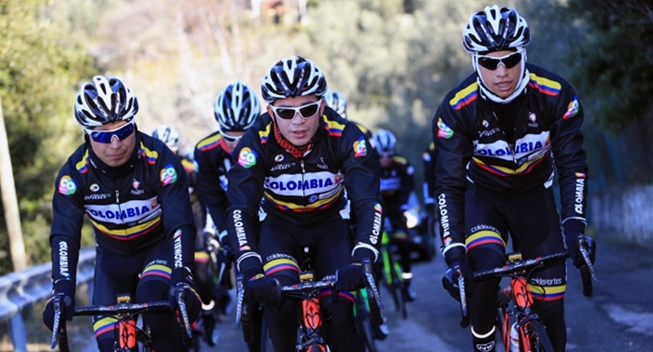Team Colombia-Coldeportes is getting ready to take on the challenge of the Vuelta a Espana. After the encouraging tests at the Vuelta a Burgos and the Tour of Utah, the Escarabajos are motivated and confident to leave their mark on a mountain-packed edition with an incredible starting list, featuring some of the top names in World cycling. The relationship between Colombia and Vuelta a Espana dates back a long time. Indeed, the legend of the Colombian climbers started right on the Spanish road, that legend Colombia-Coldeportes’ riders take inspiration from.
It is suggestive and exciting at the first time to go through this consistent progression from the 60s, when the Colombian cycling finally opened its borders to land into European competitions. That “migration” had three historical pioneers, who paved the way for everything that followed: Giovanni Jimenez, Rafael Nino and, above all, Martin Emilio “Cochise” Rodriguez.
Jimenez was the first Colombian to ride for a European team, the German Ruisbroek Sportif, back in 1968. “Cochise” Rodriguez, after winning the Vuelta a Colombia several time Vuelta a Colombia (1963, 1964, 1966 and 1967) followed the steps of his Countryman a few years later: he joined the Italian Salvarani in 1972. In 1973, he moved to the Bianchi team, winning a Giro d’Italia stage in that season. The migration continued with Rafael Nino Munevar, “El Nino de Cucaita”, the only rider in history who managed to win six editions of the Vuelta a Colombia. In 1974, he joined another Italian team – Jolly Ceramica – and would eventually become Sports Director of Lucho Herrera several years later.
These three riders showed the way for the great Colombian climbers who would surge on the European scene a few years later. Their impact became more and more significant moving forward to the 80s. That decade brought Alfonso Florez’ success at the Tour de l’Avenir, and Martin Ramirez’ legendary triumph at Criterium du Dauphiné in 1984. Meantime, the Colombian riders had already started experiencing the Vuelta’s fascination. The first in line was Giovanni Jimenez, who take part in the Spanish Grand Tour in 1974 and 1978, while not being able to complete the race in any of the two occasions.
Already in 1984, two “Escarabajos” managed to break into the Vuelta top-10: Edgar Corredor was fifth, Jose Patrocinio Jimenez seventh. The first stage win came in 1985, by the hand of Antonio “Tomate” Agudelo, in Alto de Campo. In that edition, Pacho Rodriguez and Fabio Parra, were third and fifth respectively in the final overall classification.
After no victories came in 1986, 1987 was the real breakthrough year, with the triumph of Lucho Herrera, winner of the ‘Amarillo’ jersey as well as the best climber’s classification, and no less than three Colombian stage wins: Herrera in Lagos di Covadonga, Carlo Emiro Gutierrez in Ferrol and Omar Hernandez in Segovia. A defining moment, the one in which the Colombian cycling actually rose to the global attention.
The Colombian riders have been main figures at the Vuelta ever since, collecting a number of great stage wins. To mention some: Fabio Parra (Cerler, 1988), Alberto Camargo (Segovia, 1989), Nestor Mora (Guijuelo, 1990), Alberto Camargo (Naranco, 1990), Martin Farfan (stage winner in Cerler and best climber in 1990), Fabio Parra (Valdezcaray, 1991), Luis Herrera (stage winner in Covadonga and best climber 1991), Julio Cesar Cadena(Sabinanigo, 1992), Oliverio Rincon (Covadonga, 1993), Angel Yesid Camargo (Andorra, 1994), Felix Cardenas (La Molina, 2000), Santiago Botero (Torrelavega and Madrid TT, 2001), Santiago Botero (Leon, 2002), Felix Cardenas (Sierra Nevada, 2003 and La Covatilla, 2004), Leonardo Duque (Puertollano, 2007) and, more recently, Winner Anacona, who won the stage in Valdelinares in 2014, on the same day in which Nairo Quintana wore the leader’s jersey, only to surrender it a day later due to a spectacular crash.
The Countrymen who made history, and the strong opponents of today: those will be the terms of comparison for Colombia-Coldeportes in their Spanish adventure. For all of them, it will be a honor to write the next page of Colombia’s history in the race, starting in Puerto Banus on August 22nd for three weeks of hard riding, and seize an opportunity they have earned through hard work and great effort.
| Carolin SCHIFF 39 years | today |
| Iliana VELAZCO 39 years | today |
| Volodymyr GOMENIUK 40 years | today |
| Christian ROCHA 43 years | today |
| Aleksandr ROTYAKOV 34 years | today |
© CyclingQuotes.com









